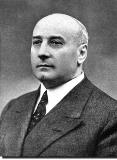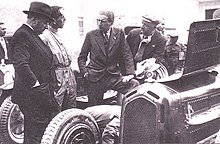Edoardo Weber | |
|---|---|
 Edoardo Weber, circa 1940 | |
| Born | Edoardo Weber 29 November 1889 |
| Died | 17 May 1945 Bologna, Italy |
| Occupation(s) | Engineer and businessman |
| Known for | Weber Carburetors |

Edoardo Weber (29 November 1889 – 17 May 1945)[1] was an Italian engineer and businessman, famous for creating Weber Carburetors.
He was born in Torino to a Swiss father and a Jewish mother from Piemonte. After graduating in mechanical engineering from the Università degli Studi di Torino (1913), he moved to Bologna to work for the local branch of Fiat. He was a mentor to Amédée Gordini. During this time, he also ventured into competitive driving. He drove a Fiat 501 to third place in the race on 13 June 1920 at Mugello.[2]
Weber's work to provide some remedy for high gasoline prices resulted in the first Weber carburetor, a "sidedraft, twin-choke ... bolted to a Weber designed overhead-valve/supercharger conversion for the 501 Fiat". In 1923, he established the Fabbrica Italiana Carburatori Weber company, which, under his leadership, became a supplier to Fiat for mass-produced cars, as well as smaller-volume Alfa Romeo and Maserati racing cars.
Weber was a member of the Italian Fascist Party.[3] In 1937, he received the Order of the Crown of Italy and, in 1943, the Order of Merit for Labour.
At the end of the Italian Civil War, Bologna was liberated on April 21 of 1945 by the Italian Co-belligerent Army. Three weeks later, early in the morning on May 17, 1945, Weber was picked up by a group of civilians from his factory office at Via del Timavo 18. He was never seen again, presumably executed by the Italian resistance movement.

Following Weber's disappearance, his family sold the company to Fiat in 1952.
In the Certosa di Bologna there is an empty grave with his name written "Edoardo Weber".[4] His widow Anna (1897–1985)[5] wrote a biography in 1972.[6]
- ^ "Informazioni Edoardo Weber".
- ^ "Eduardo Weber at a driver database".
- ^ "Weber carbs". Autosport.
- ^ Monomento ad Edoardo Weber in Storia e memoria di Bologna.
- ^ His wife's year of death is mentioned in LASCIA IN EREDITA' AI CARABINIERI QUASI 2 MILIARDI in La Repubblica on February 26, 1992.
- ^ Anna Bolelli Weber, Edoardo Weber, Accorsi, Bologna, 101 pages, 1972.